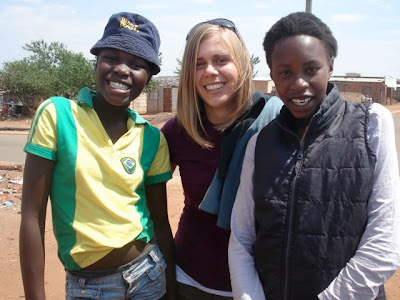Ko Ko: This phrase is used instead of actually knocking when entering someone's yard or house.
On Thursdays, we go and meet with people that have visited church or that we have met who seem interested in learning more about God. We have also begun to meet with the families of the girls from our Girls Club.
These are two of our really good friends, Sibongile and Tracy (the mama of the baby I'm holding). Sibongile went visiting with us and was our translator. Zulu is coming along slowly but I try to use some of the words I do now in every conversation.
I enjoy having cultural experiences... so we decided to get a soda from Stokie's Tuck Shop. I was able to ask how much (malini) a drink was in Zulu. You can find these tuck shops on most streets in Soweto, where people have turned their homes into a shop for income. This was a very nice one.
After visiting, we had time for lunch before Girls Club. We went to get Bunny Chow, which I have wanted for a long time. We found a place on the side of the road and were excited to try this very popular South African food.
I always have a good time talking with people. Everyone is so welcoming! Most times people are shocked to see abamlungu (white people) in Soweto but are always friendly and interested in talking with us.
Bunny Chow was created by indentured Indian labourers who were brought by the British from India in the 19th century to work the sugar cane plantations in Durban. South Africa in fact has the largest population of people of Indian descent outside of India in the world (i.e. born in South Africa and not migrant).
Indians created Bunny Chow as a way for their lunches to be transported conveniently as they worked in the fields. Basically, Bunny Chow is a hollowed out loaf of bread (quarter, half or full loaf) filled with all different toppings. The one that we ate had chips (fries), ham, egg and Vienna sausage. It was bangin!


























